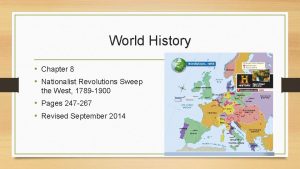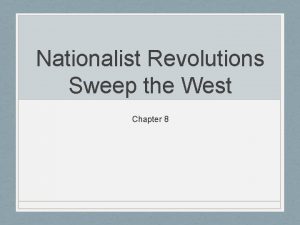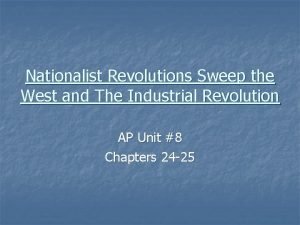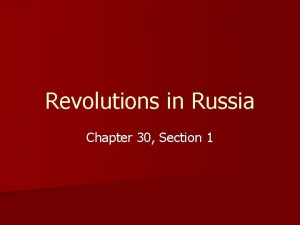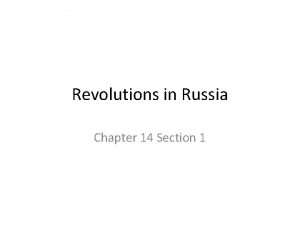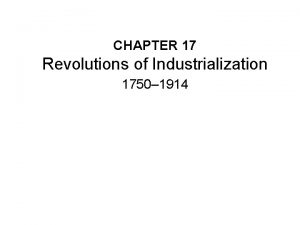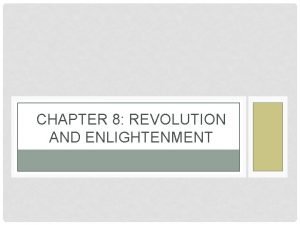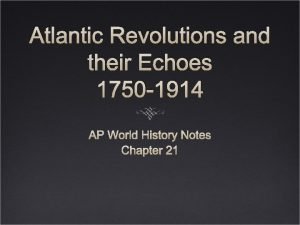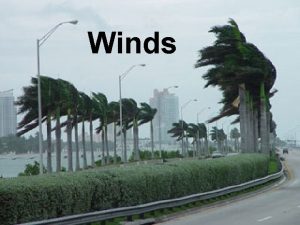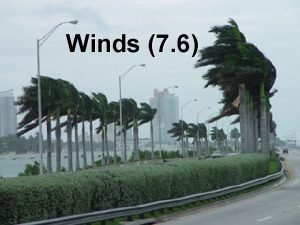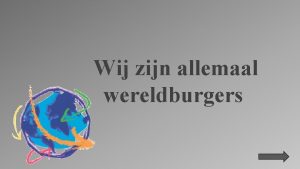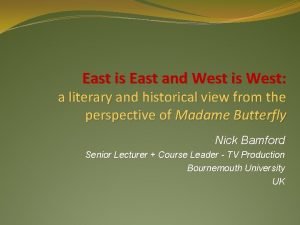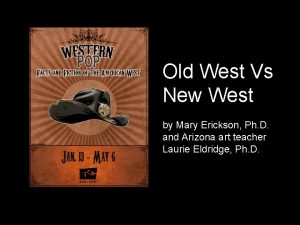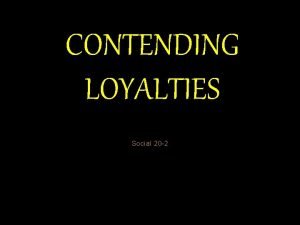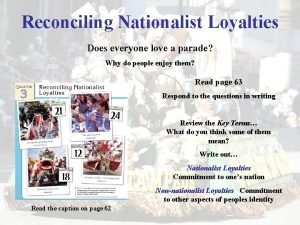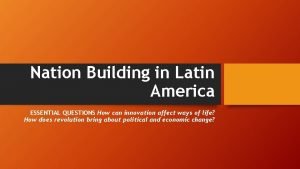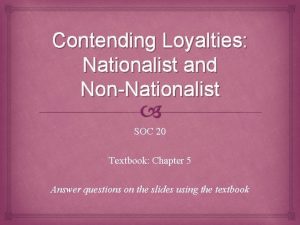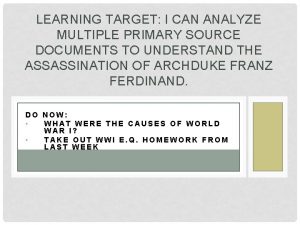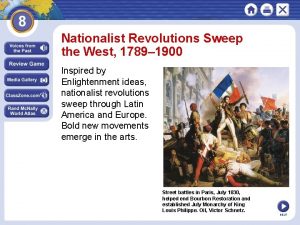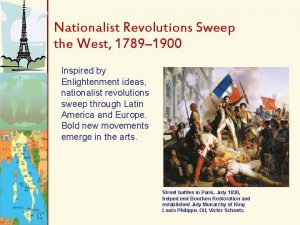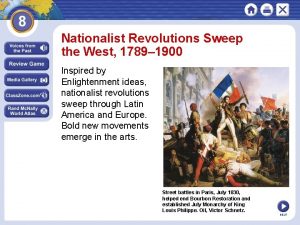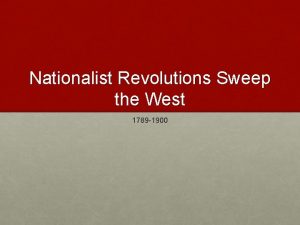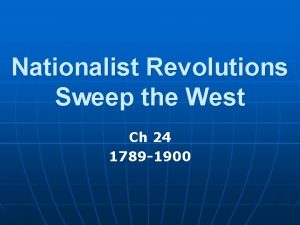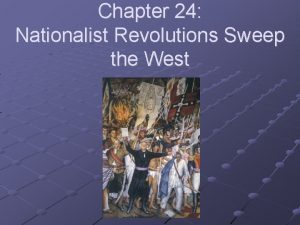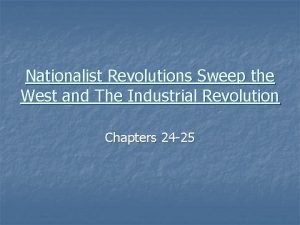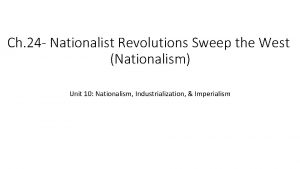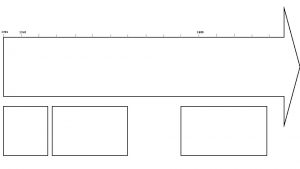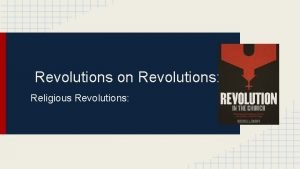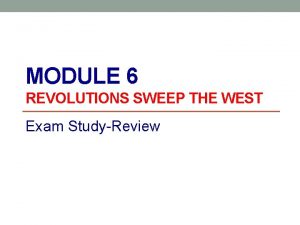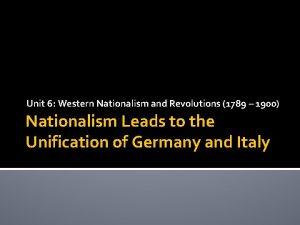NATIONALIST REVOLUTIONS SWEEP THE WEST 1789 1900 Chapter



















- Slides: 19

NATIONALIST REVOLUTIONS SWEEP THE WEST 1789 -1900 Chapter 8 World History Mr. Hernandez

LATIN AMERICAN PEOPLES WIN INDEPENDENCE Chapter 8, Section 1

SECTION 1: LATIN AMERICAN PEOPLES WIN INDEPENDENCE • Colonial Society Divided • Social Hierarchy • Peninsulares – Spaniards born in Spain living in Spanish-America, able to hold high offices • Creoles – Spaniards born in Latin America, unable to hold high offices but could gain officer status in colonial military • Mestizos – people of mixed Spanish and Indian blood • Mulattos – people of mixed Spanish and African blood • Indigenous People – native Americans, at the bottom of the social ladder

SECTION 1: LATIN AMERICAN PEOPLES WIN INDEPENDENCE • Revolutions in the Americas • Inspiration drawn from the Revolutions in North America and in France • Revolution in Haiti • Known then as Saint Domingue, a French colony • During the French Revolution, oppressed people rose up against their masters in revolt • Toussaint L’Ouverture emerged as a general to take control of the island • French forces eventually land strike a deal with L’Ouverture • Later imprison him in the French Alps • Jean-Jacques Dessalines finishes Haiti’s declaration of independence

SECTION 1: LATIN AMERICAN PEOPLES WIN INDEPENDENCE • Creoles Lead Independence • Educated creoles would not support a French king of Spain • Bolivar’s Route to Victory • Won Independence for Venezuela (1821) • Will team with San Martin • San Martin Leads Southern Liberation Forces • Argentina had declared independence • His efforts liberated Chile • San Martin and Bolivar Vision • Their vision was a Latin American nation similar to the United States called Gran Colombia

SECTION 1: LATIN AMERICAN PEOPLES WIN INDEPENDENCE • Mexico Ends Spanish Rule • Peoples’ Revolution • Hidalgo’s cry for Freedom • Grito de Delores > the cry of Delores • An army of peasants, Indians, and mestizos were defeated by Spanish forces and creoles • Mexico’s Independence • A revolution in Spain yielded a new power, which changed creoles’ views in Mexico • Creoles sought Mexican independence > the same people who fought against it a decade earlier • Mexico declared independence in 1821

EUROPE FACES REVOLUTION Chapter 8, Section 2

SECTION 2: EUROPE FACES REVOLUTIONS • Clash of Philosophies • Conservative – usually wealthy property owners and nobility. They argued for protecting traditional monarchies of Europe • Liberal – mostly middle-class business leaders and merchants. They argued to give more power to elected parliaments, but only the educated and landowners would vote • Radicals – favored drastic change to extend democracy to all people. They believed that governments should practice the ideals of the French Revolution – liberty, equality, & brotherhood • Nationalism Develops • Nationalism – the belief that the people’s greatest loyalty should not be to a king or empire but to nation of people who share a common culture and history • Liberals and radicals favored nationalistic views • Blurred the lines that separated the three philosophies

SECTION 2: EUROPE FACES REVOLUTIONS • Nationalists Challenge Conservative Power • The Greeks declare Independence • Greece vs. the Ottomans • Great support from the Russians, British, French, and the Americans • Independence in 1830 • France > Still Trying to get it Right • Charles X attempts to establish absolute monarchy, but is run off • Louis-Philippe takes over but eventually falls from power • French still can’t get it together, but establish a presidency • Louis-Napoleon becomes president, then emperor • The French people wanted peace and stability • True leadership under Louis-Napoleon

SECTION 2: EUROPE FACES REVOLUTIONS • Reform in Russia • Still stuck the Dark Ages • Feudal-like social class and sluggish economy • Defeat Brings Change • Loss in the Crimean War due to lack of technology and progress • Alexander II brought Russia toward modernization through reforms • Freed serfs > but they were still tied to land of nobles

NATIONALISM Chapter 8, Section 3

SECTION 3: NATIONALISM • Nationalism: A Force for Unity or Disunity • People use nationalism to build nation-states • Authoritarians use nationalism to unify masses of people • Nationalism Shakes Aging Empires • The Break up of the Austrian Empire • Defeat in the Austro-Prussian War saw Austria lose substantial land power • Nationalism forces Emperor Francis Joseph to recognize Austria and Hungary as two separate nation-states but claims rule over both of them • Forms Austria-Hungary > his reign continues to weaken

SECTION 3: NATIONALISM • The Russian Empire Crumbles • Nationalism helps to break up the empire of the czars • Ruled over a wide variety of ethnic groups under the empire • Russification > imposing Russian culture on all of their subjects • Push back from these groups and the strain of the Great War allowed for the communists to gain control in the early 1900 s • The Ottoman Empire Weakens • Like Russia the Ottoman Empire ruled over many ethnic groups • Push from western Europe urged the Ottomans to grant equal citizenship to all under their rule • Conservative Turks were furious at the this Radical change • In response to Armenian nationalism, they massacred/deported 1000 s • Ottoman Empire break apart after the Great War

SECTION 3: NATIONALISM • Cavour Unites Italy • Italian was a segmented peninsula of nation-states • Cavour Leads Italian Unification • Sardinian king names Count Camillo di Cavour as prime minister • With French aid, Cavour takes northern Italy from Austria • Garibaldi Brings Unity • Rebel soldier, Giuseppe Garibaldi, leads Italian nationalist army to capture Sicily • Became the leader of southern Italy but willingly allowed the Sardinian king rule all of the peninsula • Later Italy gains Venetia and the Papal States, which allows Rome to become its capital

SECTION 3: NATIONALISM • Bismarck Unites Germany • German Confederation made up of many smaller German states • Prussia ready to unify them all • Prussia Leads German Unification • Prussia almost exclusively German in ethnicity, which encourage nationalism • Bismarck Takes Control • Wilhelm I wants money from Parliament but is refused • Turns to Junkers, a faction of conservatives, and names Otto von Bismarck his PM • Realpolitik – “the politics of reality” that describes tough power politics with no idealism • Ruled without the consent of the parliament • Quick victories over Denmark inspired national pride and increase support from Germans

SECTION 3: NATIONALISM • Seven Weeks’ War • Bismarck breaks alliance with Austria and provokes them into a border war • Takes northern Germany and eastern and western Prussia were united • The Franco-Prussian War • Northern Prussia was Protestant, while southern regions were Catholic • Bismarck sought a common enemy to unite all Germans • Created impression that French ambassador insulted Prussian King • French declare war • Prussian dispatches France • War victory inspires Prussian nationalism • Wilhelm I becomes Kaiser (emperor), and rules over the Second Reich • Power Shift • From five great powers > Britain, Prussia, France, Austria, Russia • New powers > Germany and Britain

REVOLUTION IN ARTS Chapter 8, Section 4

SECTION 4: REVOLUTION IN ARTS • The Romantic Movement • Romanticism – reflected deep interest both in nature and in the thoughts and feelings of the individual • The Ideas of Romanticism • Emphasized inner feelings, emotions and imagination • Focus on the mysterious, the supernatural, and the exotic, grotesque • Love the beauties of untamed nature • Idealized the past as a simpler and nobler time • Glorified heroes and heroic actions • Cherished fold traditions, songs and stories • Valued the common people and the individual • Promoted radical changes and democracy

SECTION 4: REVOLUTION IN ARTS • Realism • Showed life how it was, not how it should be • Impressionism • Artist showed an impression of a or a moment in time
 Chapter 8 nationalist revolutions sweep the west
Chapter 8 nationalist revolutions sweep the west Which ideas of romanticism would encourage nationalism?
Which ideas of romanticism would encourage nationalism? Nationalist revolutions sweep the west
Nationalist revolutions sweep the west Chapter 30 section 1 revolutions in russia
Chapter 30 section 1 revolutions in russia Chapter 14 section 1 revolutions in russia answer key
Chapter 14 section 1 revolutions in russia answer key Atlantic revolutions global echoes
Atlantic revolutions global echoes Chapter 17 revolutions of industrialization
Chapter 17 revolutions of industrialization How were european rulers guided by enlightenment thought
How were european rulers guided by enlightenment thought Atlantic revolutions and their echoes
Atlantic revolutions and their echoes Wind is horizontal movement of air
Wind is horizontal movement of air Name of the wind series
Name of the wind series Kaart noord-oost-west-zuid
Kaart noord-oost-west-zuid East is east and west is west
East is east and west is west Old west vs new west
Old west vs new west Nationalist position definition
Nationalist position definition Non nationalist loyalties
Non nationalist loyalties Nationalist loyalties
Nationalist loyalties How were nationalist revolts in latin america
How were nationalist revolts in latin america Contending loyalties example
Contending loyalties example Serbian nationalist
Serbian nationalist
